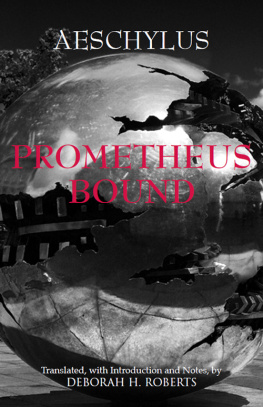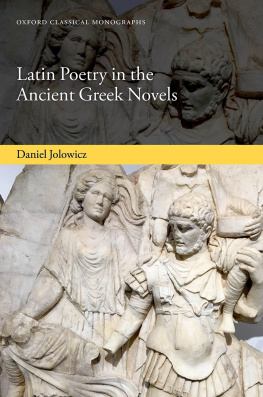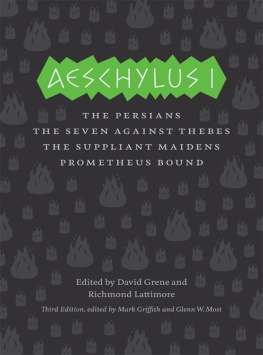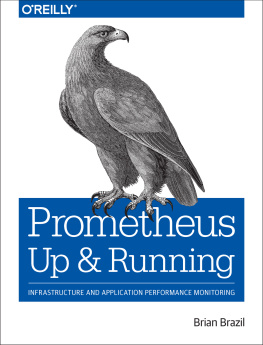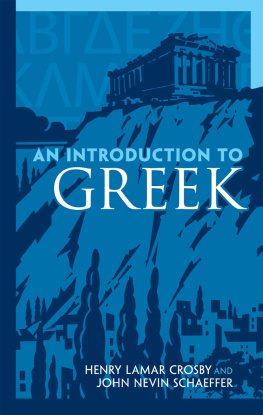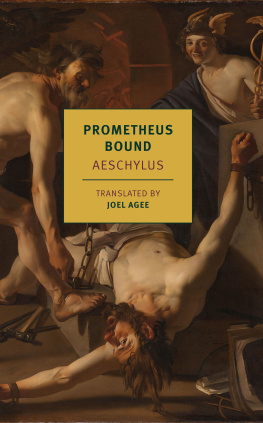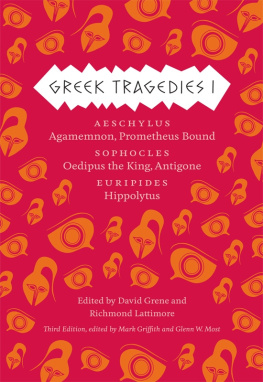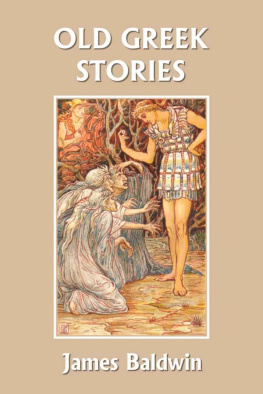Aeschylus
Prometheus BoundAeschylus
Prometheus BoundTranslated,
with Introduction and Notes, by
Deborah H. Roberts
Hackett Publishing Company, Inc.
Indianapolis/Cambridge
Copyright 2012 by Hackett Publishing Company, Inc. All rights reserved
Printed in the United States of America 15 14 13 12 1 2 3 4 5 6 7 For further information, please address Hackett Publishing Company, Inc.
P.O. Box 44937
Indianapolis, Indiana 46244-0937 www.hackettpublishing.com Cover design by Brian Rak
Interior design and composition by Elizabeth L. Wilson
Printed at Sheridan Books, Inc.
Library of Congress Cataloging-in-Publication Data Aeschylus.
[Prometheus bound.
English]
Prometheus bound / Aeschylus ; translated, with introduction and notes, by Deborah Roberts.
p. cm.
Includes bibliographical references.
ISBN 978-1-60384-190-0 (pbk.) ISBN 978-1-60384-191-7 (cloth)
1. Prometheus (Greek deity)Drama. 2. Aeschylus. Prometheus bound.
I.
Roberts, Deborah H. II. Title.
PA3825.P8 2012
882.01dc23 2011044754 ePub ISBN: 978-1-60384-864-0
Prometheus is best known to modern readers as the Greek god who stole fire from the other gods, gave it to human beings, and was cruelly punished for that theft, tortured daily by an eagle that ate his ever-regenerating liver. This story has made him doubly an emblem of resistance to power, since he embodies both wily subversion and stubborn endurance. It also associates him closely with human beings; the gift of fire, which in many accounts gives rise to and stands for technological achievement and creativity, makes him our benefactor, while his punishment makes him our fellow sufferer, subject as mortals are to the will of the ruling gods.
Prometheus Bound dramatizes a part of the myth of Prometheus that falls between the theft and the well-known punishment and looks backward and forward to other events.
Immobilized by his chains, the god can see beyond them, and takes his hearers traveling through distant regions and into past and future as he tells his own story and the stories of others.
The Play and the Myth
Prometheus Bound takes place far earlier in the chronology of Greek myth than any other surviving Greek tragedy. The war between the Olympian gods and the Titans, children of Uranus (Sky) and Gaia (Earth), has just ended. Zeus, king of the Olympians, has defeated his father, the Titan Cronus, who had previously overthrown his own father, and is newly established on the throne. Whereas in other plays the rule of the Olympian gods is a given (if sometimes hard to understand or to accept), here it is only a very recent fact, and could still, perhaps, be reversed. The plays central character, the Titan Prometheus, is Zeus former ally, the subverter of his authority, and the prophet of his potential downfall.
Prometheus theft of fire precedes the action of Prometheus Bound; the coming of the eagle that will devour his liver, announced in the concluding scene, follows the plays action by a long expanse of years. In this play, Prometheus is initially punished not by the torment of the eagle but by the agony and the isolation of his binding, and it is his response to the experience of this imprisonment that will bring on him the further punishment we expect. It is more than likely that the plays fifth-century BCE audience would also have expected this further punishment by the eagle, since it is one of the oldest elements of the myth, part of the story as told by the archaic Greek poet Hesiod, our earliest source. In his Theogony, Hesiod tells the story of the origins and genealogy of the gods. He also recounts Cronus violent overthrow of his father, Uranus, the victory of Zeus and the younger gods over the Titans, and the failure of other threats to Zeus rule. Hesiods Prometheus, here the son of the Titans Iapetus and Clymene, is a divine trickster who allies himself with mortals (minor players in this story) in opposition to Zeus; he can never finally succeed, and the help he gives mortals brings on them further suffering.
To emphasize the power of Zeus, Hesiod begins his account with the binding and torment of Prometheus, and then describes the events that precede. Prometheus first attempts to deceive Zeus into taking the bones of a sacrificial ox and leaving the meat for mortals. In his anger, Zeus withholds fire from human beings. When Prometheus then steals fire on their behalf, Zeus punishes mortals by sending them (through Prometheus thoughtless brother Epimetheus) the beautiful evil Pandora, and punishes Prometheus by imprisoning him and sending the eagle to torture him. We also learn that Heracles eventually kills the eagle and releases Prometheus, and that this is done with the permission of Zeus. Hesiod gives another (somewhat different) account of Prometheus and Pandora in his Works and Days, but between Hesiods poems and Prometheus Bound we have no surviving narratives, although there are scattered literary references and a number of visual depictions.
It is possible that an element of the story that survives only in later versions, Prometheus creation of human beings, was already a part of the myth. If so, it would help account for his otherwise unexplained affinity for mortalsan affinity also reflected in the tradition that he is the father of Deucalion, one of two survivors of the great flood that kills all other human beings. The plays Athenian audience would have known the god as the object of local cult worship; he shared with Hephaestus an altar in the outskirts of the city, and an annual torch race was held in his honor. Almost all Greek tragedies take their plots from a body of continuous myth that is consistent in its broad outlines but varied in detail. It follows that audiences typically had some knowledge of both plot and background, but the playwright might draw on less familiar versions, invent new details, and exclude or downplay elements of the story. In Prometheus Bound, Prometheus is the son not of the Titan Clymene but of Earth herself, here identified with the goddess Themis, a personification of divine law who appears in Hesiods genealogy as Earths daughter.
And Earths role in the plays background story, though it recalls aspects of her role in Hesiod, is mediated by the son to whom she conveys prophetic knowledge. In the Theogony, Earth herself tricks the Titan Cronus on behalf of his children; in Prometheus Bound, Earth is said to have told Prometheus that the victory would go to those superior in trickery, and to have joined him in an alliance with Zeus and the other gods against the Titans. Prometheus most important piece of prophetic knowledge represents a variation on another story told by Hesiod. In the Theogony, Earth and Sky warn Zeus that his marriage to the goddess Metis (personification of crafty thought) will eventually result in a son who becomes king of gods and men; to avoid this fate he swallows the pregnant Metis, and himself gives birth to Athena from his head. In Prometheus Bound, Prometheus knows that if Zeus makes a particular marriage it will result in his overthrow; though this prediction recalls the Metis story, it seems to refer instead to a similar story told by the fifth-century poet Pindar (Isthmian Odes 8), in which Themis warns Zeus and Poseidon not to pursue their courtship of the sea-goddess Thetis (later the mother of Achilles), since she is fated to bear a child stronger than his father. In another departure from Hesiod, Aeschylus has Prometheus give human beings much more than fire or crafts derived specifically from fire; he is the source of all the arts of civilized existence.

